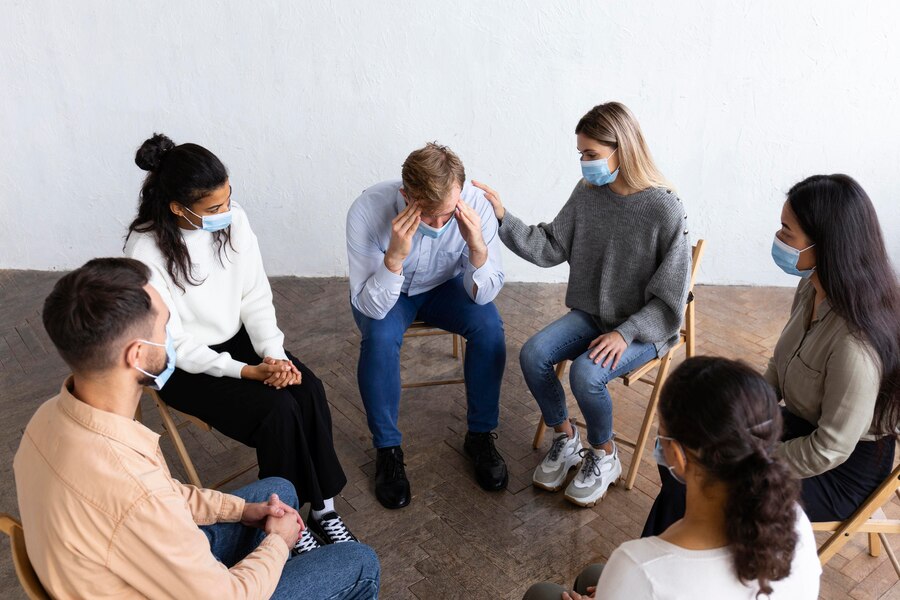Feeling alone in addiction recovery? Group therapy in addiction recovery might be exactly what you need. It’s where people come together, share stories, and lean on each other, making recovery a shared experience instead of a lonely battle. Imagine being surrounded by others who know what it’s like to walk in your shoes — that’s what group therapy offers.
Addiction Feels Isolating
Addiction has a way of making you feel isolated, like no one else understands what you’re going through. Whether you’re dealing with substance abuse, alcoholism, or any other form of addiction, loneliness creeps in and drags you down. The more isolated you feel, the harder it becomes to break free. Relapse feels like it’s always waiting around the corner, ready to pull you back.
How Group Therapy Changes the Game
But here’s where group therapy flips the script. Group therapy in addiction recovery brings people together who are facing the same struggles. Instead of battling addiction alone, you’re in a room with others who get it. They’ve been there — the highs, the lows, and the setbacks. It’s a place where you can speak up without fear of judgment because everyone understands where you’re coming from.
The Benefits of Group Therapy for Addiction
So, why is group therapy so powerful in addiction recovery? Here are a few reasons:
- Shared Experiences: You quickly learn that your experiences aren’t unique, and that’s a good thing. Hearing someone else’s story might sound like your own.
- Accountability: Being part of a group means there’s accountability. You don’t want to let others down, and that push can keep you on track.
- Emotional Support: The emotional rollercoaster of recovery is tough to ride solo. Your group provides support when you need it most.
- Relapse Prevention: When you feel the urge to relapse, your group can help you talk through it, spot your triggers, and keep you from falling back into old habits.
Different Group Therapy Models to Know
Not all group therapy sessions are the same. Here’s a look at a few types you might come across:
- 12-Step Programs (like Alcoholics Anonymous and Narcotics Anonymous): These are the most well-known. They focus on spirituality, shared experiences, and peer support to guide you through recovery.
- Cognitive Behavioral Therapy (CBT) Groups: CBT helps you break down negative thought patterns that lead to addiction and replace them with healthier ways of thinking. Group CBT brings people together to work through this process as a team.
- Dialectical Behavior Therapy (DBT) Groups: DBT focuses on teaching emotional regulation and building healthier relationships, which is key to preventing relapse. It’s especially helpful for those struggling with co-occurring disorders.
- Peer Support Groups: Sometimes, all you need is to talk to others who are going through the same struggles. Peer support groups are less structured but incredibly valuable for emotional support and camaraderie.
Who Is Group Therapy For?
You might be wondering if group therapy in addiction recovery is the right move for you. Here’s who benefits most:
- You need support: If you’ve tried going it alone and it hasn’t worked, a group offers the support you’ve been missing.
- You want accountability: Recovery isn’t easy, and it’s even harder without someone holding you accountable. A group provides that gentle nudge to keep moving forward.
- You’re struggling with isolation: If the loneliness of addiction is weighing you down, joining a group can give you a sense of connection and belonging.
Types of People You’ll Meet in Group Therapy
Everyone in group therapy has their own story, but here are a few types of people you’ll likely run into:
- The Veteran: They’ve been sober for years and are here to stay grounded and give back to the group. Their wisdom can be a lifesaver.
- The Newcomer: Just starting their recovery journey, they remind you of how far you’ve come and give you perspective.
- The Relapser: They’ve stumbled but keep coming back, showing you that slip-ups don’t mean failure.
- The Quiet One: They don’t say much at first, but over time, they start to share more, reminding everyone that healing takes time.
What Happens in Group Therapy Sessions?
In group therapy, there’s no one-size-fits-all. Each session depends on the group dynamic and the therapy model being used. But typically, you’ll:
- Share your progress: You’ll have the chance to talk about how your week went, any struggles, and any wins you’ve had.
- Listen to others: You’re not just there to talk; you’re there to listen. Hearing someone else’s story can spark new insights into your own recovery.
- Learn coping skills: In structured groups like CBT or DBT, you’ll practice coping mechanisms to manage cravings, stress, and emotional triggers.
- Work on relapse prevention: The group will help you identify your personal triggers and work on strategies to avoid relapse.
Ready to Try Group Therapy?
Group therapy in addiction recovery is about connection, support, and accountability. It’s a powerful way to beat the isolation of addiction and stay on track with your sobriety. If you’re ready to take that step, don’t wait — find a group therapy session near you and start building the community you need.

